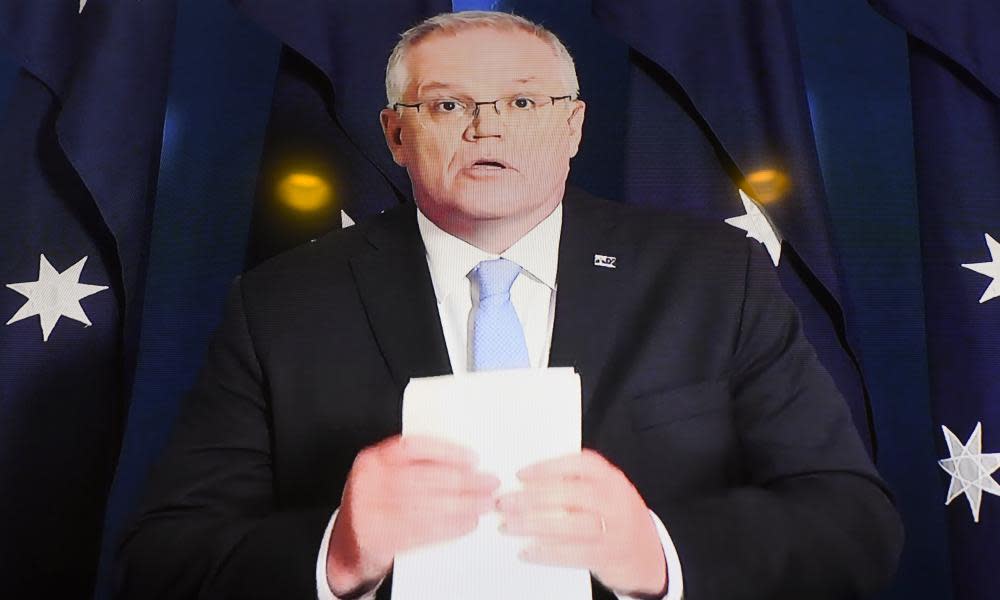Does Australia really have to be so strident when it comes to China?

China’s propaganda apparatus can’t help itself. Just when the punishment dealt by Beijing for Australia’s strident criticism has been sinking in among exporters, it gave Scott Morrison a cue to deflect any recriminations by waxing long and angry at this slur on our sainted military.
The tweet by the foreign ministry spokesman, Zhao Lijian, accompanied by a digitally altered image of an Australian soldier about to slit the throat of an Afghan child wrapped in an Australian flag, was a cheap shot, especially as Zhao’s text called for action Canberra was already taking: prosecution of the soldiers accused of war crimes.
But the illustration was no more offensive than numerous examples by graphic artists and cartoonists in the Australian media – and no more than a stretch on what Justice Brereton said allegedly happened: special forces soldiers cutting the throats of two Afghan 14-year-olds in their custody. An even cheaper shot came from the Russian foreign ministry, as if Chechnya and the murder of the whistleblowing journalist Anna Politkovskaya hadn’t happened.
Related: Australian PM demands China apologise for 'repugnant' tweet with fake image of soldier
Still, it was enough for the prime minister to demand an official apology from Beijing, in a reversal of the usual complaint that Australia was “hurting the feelings of the Chinese people” by accusing their government of spying, interference and human rights abuses. Did it deserve more than a quiet note of regret?
Meanwhile, the Australian wine industry is reckoning with tariffs of up to 212% imposed from Saturday on its exports to China, effectively stopping a $1.4bn a year trade and negating years of marketing by big players including Treasury Wine Estates and many smaller vineyards.
On top of chemicals suddenly found in beef and lobsters, beetles in timber, hidden subsidies in barley, and low quality in coal, punishment is mounting up to about $21bn of Australia’s $147bn in goods and services exports to China, which has numerous alternative sources for these items. Only when it comes to iron ore does China have unavoidable dependence on Australia.
How did we get to this point, after four decades of mutual prosperity? The “14 complaints” given by the Chinese embassy to Canberra journalists has Beijing’s side of it. We have certainly inflicted some damage. We started the exclusion of China’s Huawei from 5G mobile networks. We barred some Chinese investments on puzzling grounds (when did milk companies become strategic?). We launched 140 anti-dumping actions ourselves.
A lot of the rest are more about the theatrics surrounding our responses to things done by China or Chinese individuals. The responses were mostly justified. Foreign political donations should have been banned. Security agencies should have blocked attempts to intimidate 1.2 million Chinese Australians. Most of us are appalled at what Beijing has been doing in Xinjiang and Hong Kong. Xi Jinping’s centralisation of power on himself for life, his surveillance state, his sanctioned theft of technology, all make the outside world uneasy.
But did Malcolm Turnbull have to quip, in bad Mandarin, that “Australia has stood up” when announcing the foreign interference laws, the facile reference to Mao Zedong’s 1949 speech making it clear it was all about China? Did Morrison have to talk about “weapons inspector powers” when making the first call for an outside inquiry into the Wuhan Covid-19 outbreak? Did Asio have to raid four Chinese journalists at dawn? Did Peter Dutton have to ban two Chinese scholars of Patrick White and other Australian subjects? Does Morrison have to say that Australian values are not for sale or surrender, as if that was the only alternative to hostility?
Some of our most senior foreign policy experts say we don’t have to be this strident, or out in front. Instead there should be a careful calculation of national interest and risk, leading if necessary to polite Japanese-style criticism or collective statements alongside likeminded nations.
As the economic commentator David Uren has written, the weakened standing of the Nationals within the Coalition has contributed to the lack of such calculation. They lost the trade portfolio in 2013, previously held by figures including Jack McEwan, Doug Anthony and Tim Fischer. “None would have sat quietly musing on mutual dependence while core markets were threatened,” Uren said.
Canberra’s constant anti-China static has, meanwhile, blurred two important signals Morrison’s government has sent China this year. One was the foreign affairs minister Marise Payne’s “Love Actually” moment this August when she stood beside the US secretary of state, Mike Pompeo, and pointedly declined to endorse his efforts to declare the Communist party of China illegitimate. Another was Morrison’s video speech to London’s Policy Exchange this month, praising Beijing for lifting so many people out of poverty.
In her National Security College speech last week, Department of Foreign Affairs and Trade secretary, Frances Adamson, said China “may have reached a point where it believes that it can largely set the terms of its future engagement with the world”, which she said would be a mistake.
Then, answering a student’s question about “one thing that we are doing that you wish we’d stop” Adamson said: “Maybe there was a time when we probably were inclined to say a bit too much.” She added: “Being a good partner often means listening really intently.”
Speaking from quarantine at the Lodge about the outrageousness of Zhao’s tweet, at some length, Morrison then had trouble with the inward audio feed of reporters’ questions. It was a kind of metaphor for his diplomatic style.
• Hamish McDonald is a former foreign editor of the Sydney Morning Herald and regional editor of the Far Eastern Economic Review. He was SMH-Age correspondent in Beijing from 2002 to 2005


